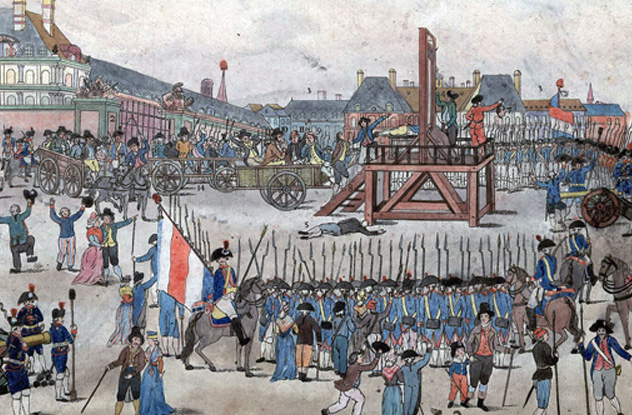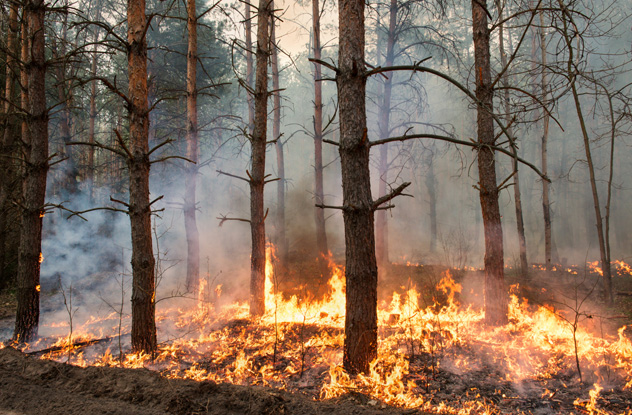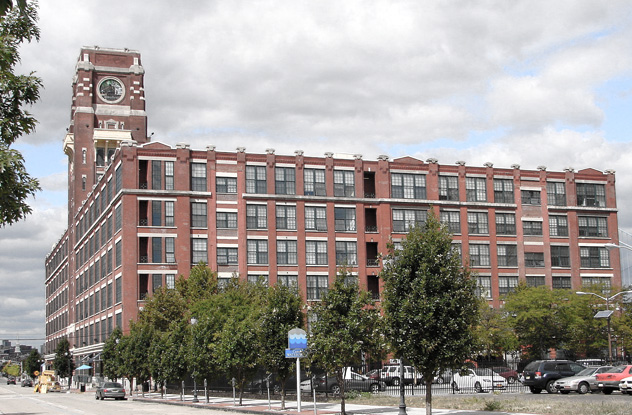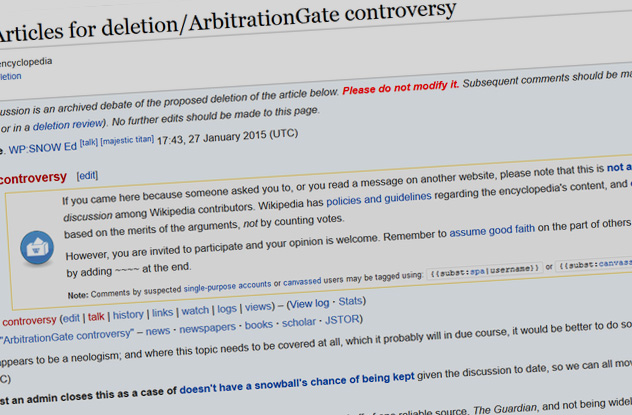 Weird Stuff
Weird Stuff  Weird Stuff
Weird Stuff  Animals
Animals 10 Inspiring Tales of Horses Being Human
 Mysteries
Mysteries Top 10 Haunting Facts About the Ghost Ship MV Alta
 History
History 10 Surprising Stories About the Texas Rangers
 Humans
Humans 10 Philosophers Who Were Driven Mad by Their Own Theories
 Miscellaneous
Miscellaneous 10 Video-Game-Worthy Weapons and Armors from History
 Weird Stuff
Weird Stuff 10 Psychics Who Accurately Predicted Wartime Events
 The Arts
The Arts 10 Pieces of Art Inspired by a Broken Heart
 Health
Health 10 Science Fiction-Sounding New Medical Treatments
 History
History 10 Surprising Facts About the Father of Submarine Warfare
 Weird Stuff
Weird Stuff 10 Times Real Laws Were Based on Bizarre Hypotheticals
 Animals
Animals 10 Inspiring Tales of Horses Being Human
 Mysteries
Mysteries Top 10 Haunting Facts About the Ghost Ship MV Alta
Who's Behind Listverse?

Jamie Frater
Head Editor
Jamie founded Listverse due to an insatiable desire to share fascinating, obscure, and bizarre facts. He has been a guest speaker on numerous national radio and television stations and is a five time published author.
More About Us History
History 10 Surprising Stories About the Texas Rangers
 Humans
Humans 10 Philosophers Who Were Driven Mad by Their Own Theories
 Miscellaneous
Miscellaneous 10 Video-Game-Worthy Weapons and Armors from History
 Weird Stuff
Weird Stuff 10 Psychics Who Accurately Predicted Wartime Events
 The Arts
The Arts 10 Pieces of Art Inspired by a Broken Heart
 Health
Health 10 Science Fiction-Sounding New Medical Treatments
 History
History 10 Surprising Facts About the Father of Submarine Warfare
10 Decisions With Bizarrely Unexpected Consequences
The road to hell is paved with good intentions. Time and again, seemingly sensible decisions have made things 1,000 times weirder and worse for everyone involved.
10A Mountaineering Film Made Climbing Everest Impossible
The 1924 British Everest Expedition is one of the most infamous summit attempts of all time, thanks to the tragic disappearance of climbers George Mallory and Andrew Irvine. Really, though, it should be known for something much stupider. As a direct result of the official decision to film the expedition, mountaineers were banned from entering Tibet for years.
As part of the publicity surrounding the attempt, the publicly funded Mount Everest Committee commissioned Captain John Noel to make a stirringly patriotic film. Noel outdid himself. His Epic of Everest is now considered a masterpiece of documentary filmmaking, thanks to its pioneering scenes of high-altitude ice fields and daily Tibetan life. Its premiere, meanwhile, is considered a masterpiece of how to create an international incident. To drum up publicity, Noel illegally flew over a group of Tibetan monks known as lamas and publicly humiliated them.
The lamas were made to dance onstage and pose with llamas at the London Zoo to give the British public a good chuckle. The Tibetan authorities considered this an outrage to their religious dignity. Already incensed by Noel’s decision to include scenes of an elderly Tibetan eating lice in his movie, they responded by permanently closing Everest to further climbing expeditions.
This set back the conquering of Everest by many years. It may have also had even graver consequences. It’s been suggested that the affair of the dancing lama undercut the 13th Dali Lama’s modernization program, leaving Tibet dangerously ill-prepared for an invasion by their better-equipped Chinese neighbors.
9The French Revolution Delayed The Abolition Of Slavery

The year 1792 was a bad one for British slavery. The radical Society for the Abolition of the Slave Trade under Thomas Clarkson had successfully delivered 519 separate petitions to the House of Commons demanding abolition, the single biggest number ever delivered on any issue. By the end of the year, the government had voted to abolish the trade altogether. You might be wondering why 1792 isn’t now known as the year British slavery ended. For that, you can thank the French Revolution.
Since 1789, governments across Europe had been worried by the revolutionary fervor in France. By 1792, that worry had reached a fever pitch. Louis XVI had been arrested and the monarchy abolished. By 1793, when the British parliament came to vote again on abolition, the French royal family had all been executed, and the Reign of Terror was underway. Terrified of a similar revolution sweeping Britain, the UK government became deeply suspicious of radical movements—including the abolitionists. As a direct result of the chaos in France, the House of Commons reversed its decision of 1792. Slavery as an institution would continue in the British Empire for another 40 years.
8The Policy Against Forest Fires Made Forest Fires Much Worse

Every year, increasingly large fires turn swaths of the country into an inferno, destroying homes and businesses and tracts of national parks. By some estimates, today’s fires are worse than any the region has seen in the last 3,000 years. The culprit: the US Forest Service.
When the Service was formed in the late 19th century, it had one clear mandate: to stop all fires in the Southwest in the shortest time possible. They even promoted a complete ban on wildfires, and they almost succeeded at this impossible task. The result was a massive expansion of trees across New Mexico, Arizona, Colorado, and Utah. Grasses and shrubs also flourished. And all this wood and grass makes remarkably good kindling.
Though nature had previously cleared out the dead wood and shrubs with small but frequent forest fires, the 20th century saw the wood allowed to build up instead. Today, the entire region is now a giant powder keg, just waiting for the first seasonal spark to make it explode. The result is the horrifying annual megafires we now witness, all so our ancestors wouldn’t have to put up with the occasional blaze.
7The Invention Of The Internet Put Pimps Out Of Work

As one of the greatest technological revolutions in history, the Internet changed things for nearly everyone. Without it, we’d still be communicating by letter, watching films mainly on DVD, and getting our daily fix of list-based articles from magazines. We’d also be living in more of a pimptastic world, as the Internet’s spread is driving pimps firmly out of business.
Twenty years ago, becoming an escort meant locating a madam or pimp to bring in business. Modern prostitutes, however, are going the DIY route and setting up websites. Instead of standing on street corners (although some definitely still do that), many are now more likely to be concentrating on their social media presence or setting up PayPal accounts and designing offers. This migration to online work has made life as a sex worker much safer. Aside from reducing the number of one-off clients a worker has while boosting their repeat business, it’s gotten them away from the stereotype of controlling pimps. Today, 93 percent of online escorts consider themselves “independent.”
6Budget Cuts Made A US Town One Of The Deadliest Places On Earth

In 2014, CNN named Camden, New Jersey, one of the most dangerous cities in America. That’s still an improvement from the 2011–2013 period, when Rolling Stone christened it “Apocalypse, New Jersey.” At that time, the murder rate was higher than anywhere else in the US, and the FDA had announced the city was a “food desert.” Police had abandoned the streets. The nightmare was due to a combination of unionized policemen and budget cuts.
Since industry collapsed in the 1990s, Camden’s police force had enjoyed job perks second to none. Cops got bonuses for every single shift, overtime was rarely refused, and everyone got a paid day off for their birthday. When Chris Christie took over as governor of the state, he tried to reduce Camden’s spending. The Camden PD union refused to budge, and Christie threatened to increase his cuts. Had either side blinked or compromised, it would now be a little-remembered trade dispute. Instead, both refused to give any ground, Christie slashed the budget regardless, and the city became a warzone.
5Ebola Controls Made The Ebola Outbreak Even Worse

In 2014, an outbreak of Ebola in West Africa quickly flared up to become the worst epidemic of the disease in recorded history. Thousands of people were infected, and the rest of the world panicked. Flights were canceled, and borders were closed. The end result made the Ebola outbreak even worse than it already was.
With no flights heading to or from the countries, medical professionals couldn’t reach regional conferences. Sierra Leone’s health minister missed an important conference that was specifically called to help his country because he couldn’t fly to Ghana. Vital aid from Japan was significantly delayed because it could only land in Accra, leaving local agencies to drive the remaining 1,500 kilometers (900 mi).
The quarantines also made things difficult for ordinary people. In Sierra Leone, the conditions in the quarantine zones were so appalling that they sparked deadly riots, while their unsanitary state may have spread the outbreak faster. Outside of Africa, 21-day quarantine periods likely stopped some doctors and nurses from volunteering to combat the disease. With a less hysterical response to the outbreak, lives may well have been saved.
4Laws Against Texting While Driving Laws Possibly Increased Fatalities

If you’ve ever seen filmmaker Werner Herzog’s terrifying documentary on the subject, you’ll know that texting while driving is a very bad idea indeed. In light of the increased fatalities associated with cell phones, most states got round to banning the practice. It was a sensible decision but one with totally unforeseen consequences. In several states, these new laws may have increased fatalities.
In 2010, researchers from the Highway Loss Data Institute analyzed insurance claims from states that had banned texting, comparing them to those that hadn’t. In states that banned texting while driving, the number of crashes stayed the same or even increased in the wake of the new laws. This was particularly noticeable with drivers under 25, the category most likely to text. According to the researchers, the new laws encouraged drivers to text with their phones in their laps, significantly reducing visibility at the wheel.
Not everyone was convinced, however. The Department of Transportation called the study misleading, claiming that their own research pointed to a different conclusion.
3An Irish Anti-Drug Law Accidentally Legalized Ecstasy

Back in the 1970s, the international War on Drugs was in full swing. As part of this global crackdown, the Irish government introduced the Misuse of Drugs Act. The law let the government simply add new substances to the banned list as they were created, rather than legislate for each in turn. It was a simple piece of legislation designed to further the anti-drug cause, until a court struck it down in 2015 as unconstitutional. The knock-on effect was to make every drug outlawed under the act de facto legal.
Although this didn’t affect older drugs like cannabis, heroin, and cocaine, it did apply to ecstasy, magic mushrooms, crystal meth, and ketamine. For nearly a whole day, possession of these and nearly 100 other substances could no longer be considered a crime. Not until the government rushed through emergency legislation were the drugs recriminalized. Although there’s no evidence that anyone who would otherwise have been arrested got away with drug-related crime during this period, it still managed to make a mockery of Ireland’s whole stance on prohibition.
2A Wikipedia Ruling Promoted Misinformation About Wikipedia Itself

Thanks to its strict policy against original research, Wikipedia cannot let a claim stand unless it is backed up by a respected source such as the BBC or the New York Times. While this aims for accuracy, it doesn’t always succeed.
For example, in 2012, award-winning author Phillip Roth was giving himself a little ego boost by looking over the Wikipedia page for his novel The Human Stain. He came across a line about his novel being “allegedly inspired by the life of the writer Anatole Broyard,” which was patently false. Roth contacted the website to point out their mistake and was told the line couldn’t be changed, as Roth could not supply secondary sources to back up his claim. In this instance, the editors specifically ruled that Roth’s opinion on his own novel was worth less than the opinion of some newspaper critic.
The policy would come back to plague them. In 2014, The Guardian published an article alleging that Wikipedia had banned five feminist editors for reporting the misogynistic attitudes of the anti-corruption lobby. The article was provably false: Nobody had been banned, and there was no anti-feminist witch hunt going on. Yet Wikipedia created its own page on the scandal, dubbed “ArbitrationGate.” The page parroted The Guardian‘s story, despite everyone at Wikipedia knowing it was incorrect.
Within hours, editors deleted the page—it was satirical, and the topic wasn’t notable enough for its own article. But so long as it remained up, editors couldn’t correct its content. According to precedent, The Guardian was a more trusted source on Wikipedia than Wikipedia itself.
1Disbanding The MET’s Women’s Force Set Rape Reporting Back Decades

In the 1970s, British policing was split into two gender-distinct units. While male officers handled general crime and dangerous duties, female officers were automatically on call for cases involving children or sexual assault. Then, in 1973, London’s MET police decided to integrate the two branches. Women were given equal pay and equal opportunities and were finally allowed into senior positions. But this sudden change also had one remarkable downside.
Because integration was meant to be total, women with 20 years of experience working with sexual assault victims suddenly found themselves assigned to an unrelated division. Meanwhile, untrained men who had always left such delicate cases to the female officers found themselves responsible for traumatized victims. MET insiders and former officers claimed that this set the treatment of assault victims back substantially. Bored, rude, or simply ill-prepared male officers wound up frequently siding with the suspected rapist.
It took until the 1980s for specialist training to become mandatory in such cases. Even today, things are still far short of where they used to be. In 2012, multiple female assault victims successfully sued the MET for its poor handling of their cases.








